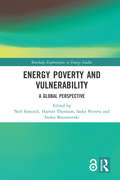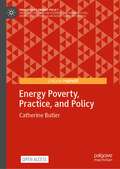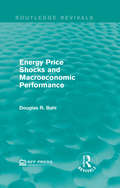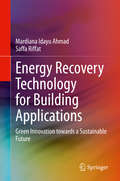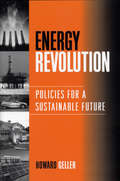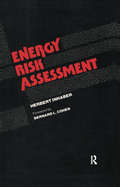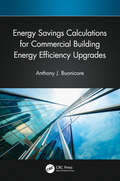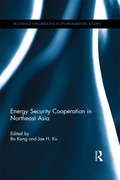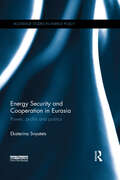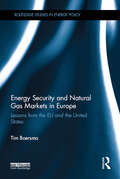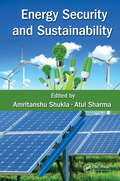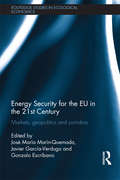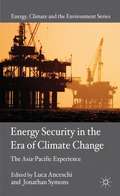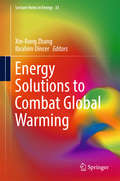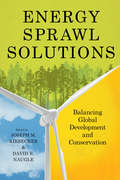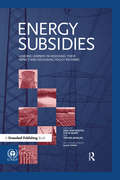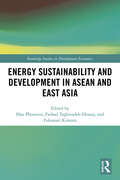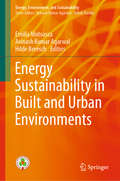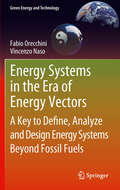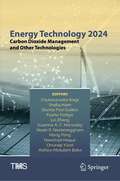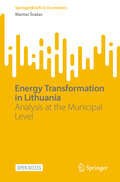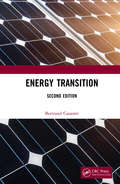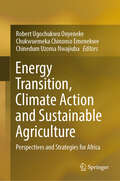- Table View
- List View
Energy Poverty and Vulnerability: A Global Perspective (Routledge Explorations in Energy Studies)
by Stefan Bouzarovski Neil Simcock Harriet Thomson Saska PetrovaHuman health and well being are closely intertwined with the ability to access affordable and modern domestic energy services, including heating, cooling, lighting, cooking, and information technology. Energy poverty is said to occur when such amenities cannot be secured up to a socially- and physically- necessitated level. Millions of people across the world suffer from energy poverty due to a combination of financial, social and technical circumstances. Energy Poverty and Vulnerability provides novel and critical perspectives on the drivers and consequences of energy-related injustices in the home. Drawing together original research conducted by leading experts, the book offers fresh and innovative insights into the ways in which hitherto unexplored factors such as cultural norms, environmental conditions and household needs combine to shape vulnerability to energy poverty. Case studies from a wide range of countries are presented, thus providing the first globally-integrated account of a policy and research domain that has previously been divided between the Global South and North. An examination of the diverse manifestations of energy poverty is supplemented by an identification of this condition’s shared and context-specific causes. Conveying policy-relevant insights that can inform decision-making, this book can be of great interest to students and scholars of energy demand, social justice, and sustainability transitions, as well as decision-makers and practitioners who wish to find out more about this complex issue.
Energy Poverty, Practice, and Policy (Progressive Energy Policy)
by Catherine ButlerThis Open Access book examines the implications of welfare policy for energy poverty and engages with key conceptual debates at the forefront of energy demand research. Academic work on energy poverty has rarely been brought into conversation with practice-theory-based approaches to energy use and sustainability. This book reveals how novel insights can be made visible through combining these different ways of thinking about energy demand issues. It presents a distinctive approach to energy poverty that places inequalities at the heart of debates about the advancing energy intensity of contemporary societies.
Energy Price Shocks and Macroeconomic Performance (Routledge Revivals)
by Douglas R. BohiThe oil price shocks of the 1970’s led to severe recessions in the 1980’s in the United States. Originally published in 1989 in the aftermath, Bohi attempts to show both how energy prices can cause a decline in output and employment and to explore important other factors which led to the recessions using the US, United Kingdom, Japan and Germany as examples. The findings in Energy Price Shocks and Macroeconomic Performance have major implications for energy policy and questions government plans which focus solely on preventing another oil supply disruption. This title will be of interest to students of environmental studies and economics as well as professionals.
Energy Recovery Technology for Building Applications: Green Innovation towards a Sustainable Future
by Mardiana Idayu Ahmad Saffa RiffatThis book discusses energy recovery technology, a green innovation that can be used in buildings. This technology reduces energy consumption in buildings and provides energy savings to conventional mechanical ventilation systems. Divided into eight chapters, the book provides in-depth technical information, state-of-the-art research, and latest developments in the energy recovery technology field. Case-studies describe worldwide applications of energy recovery technology and its integrated system for building services. This book will be used as a general and technical reference book for students, engineers, professionals, practitioners, scientists, and researchers seeking to reduce energy consumption of buildings in various climatic conditions.Presents an overview of energy consumption scenarios in buildings and the needs for energy-efficient technologies at regional and global levels;Explains models and methods of energy recovery technology performance evaluation;Inspires further research into energy recovery technology for building applications.
Energy Revolution: Policies for a Sustainable Future
by Howard GellerThe transformation from a carbon-based world economy to one based on high efficiency and renewables is a necessary step if human society is to achieve sustainability. But while scientists and researchers have made significant advances in energy efficiency and renewable technologies in recent years, consumers have yet to see dramatic changes in the marketplace--due in large part to government policies and programs that favor the use of fossil fuels.Energy Revolution examines the policy options for mitigating or removing the entrenched advantages held by fossil fuels and speeding the transition to a more sustainable energy future, one based on improved efficiency and a shift to renewable sources such as solar, wind, and bioenergy. The book:examines today's energy patterns and trends and their consequencesdescribes the barriers to a more sustainable energy future and how those barriers can be overcomeprovides ten case studies of integrated strategies that have been effective in different parts of the worldexamines international policies and institutions and recommends ways they could be improvedreviews global trends that suggest that the transition to renewables and increased efficiency is underway and is achievableEnergy policy represents a linchpin for achieving a broader transition to a more sustainable economy. Energy Revolution offers a unique focus on policies and programs, and on the lessons provided by recent experience. It represents a key statement of the available options for reforming energy policy that have proven to be successful, and is an essential work for policymakers, researchers, and anyone concerned with energy and sustainability issues.
Energy Risk Assessment
by Herbert InhaberFirst Published in 1982. Comprehensive and controversial, this book presents an overview of the energy options available and their attendant risks. The entire energy cycle- from raw material to final energy production- is examined in depth so that accurate and detailed assessments can be made of the risks of energy options.
Energy Savings Calculations for Commercial Building Energy Efficiency Upgrades
by Anthony J. BuonicoreCode-compliant building materials and equipment will typically have a lower initial cost; however, the lifetime energy savings of the high efficiency equipment will often justify the upfront cost premium and result in a more cost-effective solution. Energy Savings Calculations for Commercial Building Energy Efficiency Upgrades assists energy professionals, contractors, building owners, and managers in developing energy savings estimates that can facilitate a quick assessment of the potential energy savings that might be realized when replacing existing building components with the highest efficiency equipment. It also provides algorithms to estimate greenhouse gas emission reductions that may be achieved by building energy efficiency upgrades and the impact these upgrades can have on building electrification-decarbonization projects. This book: Focuses on the development of energy savings estimates based upon a whole building’s energy consumption and the energy consumption associated with building end-uses such as space heating, space cooling, ventilation, lighting, and so forth. Includes over 70 illustrative examples using algorithms to demonstrate how energy savings and greenhouse gas emission reductions may be estimated utilizing different strategies and equipment.
Energy Science and Applied Technology: Proceedings of the 2nd International Conference on Energy Science and Applied Technology (ESAT 2015)
by Zhigang FangEnergy Science and Applied Technology includes contributions on a wide range of topics:- Technologies in geology, mining, oil and gas exploration and exploitation of deposits- Energy transfer and conversion, materials and chemical technologies- Environmental engineering and sustainable development- Electrical and electronic technology, power system
Energy Security Cooperation in Northeast Asia (Routledge Explorations in Environmental Studies)
by Jae H. Ku Bo KongDrawing on cutting-edge research from leading scholars, this book investigates state preferences for regime creation and assesses state capacity for executing these preferences in Northeast Asia’s energy domain, defined as the geographical area comprising the following countries: Russia, Mongolia, China, Japan, South Korea and North Korea. It examines questions pertaining to how states perceive the need and necessity for establishing a regime when it comes to the issue of energy and how much commitment they make to the effort in Northeast Asia. The book analyses the factors that shape each country’s fundamental energy interests in the region, how these interests impact their attitudes toward engaging the region on energy security and the way they carry out their regional engagement. Based on countries’ interests in promoting institutionalized regional energy cooperation and their capacity for forging that cooperation, the collection assesses each state’s role in contributing to an energy regime in Northeast Asia. It then concludes with a critique on the decade-plus quest for energy security cooperation in Northeast Asia and suggests ways forward for facilitating regional energy security cooperation. This book will be of great interest to scholars and students of environmental policy, energy policy, security studies, Asian studies and international relations.
Energy Security and Cooperation in Eurasia: Power, profits and politics (Routledge Studies in Energy Policy)
by Ekaterina SvyatetsWhy are bilateral relations, especially in the area of energy security, so different in the cases of U.S.-Russia, U.S.-Azerbaijan, and Russia-Germany energy deals? Why do some states find common ground despite differences, while others, with all the seemingly favourable conditions, are sinking into animosity? Energy Security and Cooperation in Eurasia explores varying outcomes of energy cooperation, defined as diplomatic relations, bilateral trade, and investment in oil and natural gas. The book looks at economic potential, geopolitical rivalry, and domestic interest groups in the cases of U.S.-Russia, U.S.-Azerbaijan, and Russia-Germany energy ties. It looks at major projects in each case (Sakhalin and Arctic oil and gas production, Baku-Tbilisi-Ceyhan and Nord Stream pipelines) and activities of international oil companies. The book also provides a detailed analysis of the situation in Ukraine since 2014 and Russia’s annexation of Crimea, and their effect on European energy security. This book utilizes an innovative approach of exploring the dyads of states (bilateral relations) along the economic, geopolitical, and domestic lobbying dimensions. This book is a valuable resource for graduate and undergraduate students, academics and researchers in the areas of Security, Political Economy, Comparative Politics, post-Soviet studies, as well as for general public.
Energy Security and Natural Gas Markets in Europe: Lessons from the EU and the United States (Routledge Studies in Energy Policy)
by Tim BoersmaMoving beyond most conventional thinking about energy security in Europe which revolves around stability of supplies and the reliability of suppliers, this book presents the history of European policy-making regarding energy resources, including recent controversies about shale gas and fracking. Using the United States as a benchmark, the author tests the hypothesis that EU energy security is at risk primarily because of a lack of market integration and cooperation between member states. This lack of integration still prohibits natural gas to flow freely throughout the continent, which makes parts of Europe vulnerable in case of supply disruptions. The book demonstrates that the EU gas market has been developing at different speeds, leaving the Northwest of the continent reasonably well integrated, with sufficient trade and liquidity and different supplies, whereas other parts are less developed. In these parts of Europe there is a structural lack of investments in infrastructure, interconnectors, reverse flow options and storage facilities. Thus, even though substantial progress has been made in parts of the EU, single source dependency often prevails, leaving the relevant member states vulnerable to market power abuse. Detailed comparisons are made of the situations in the Netherlands and Poland, and of energy policy in the USA. The book dismantles some of the existing assumptions about the concept of energy security, and touches upon the level of rhetoric that features in most energy security and policy debates in Europe.
Energy Security and Sustainability
by Atul Sharma Amritanshu ShuklaThere has been ever increasing interest in understanding the various aspects of available resources and production, in terms of need and supply, conservation and environmental impacts and so on. From the current energy scenario, it is very clear that there are serious challenges related in achieving energy sustainability and security worldwide. The aim of this book is to present an overview of progress made towards energy sustainability addressing concerns regarding carbon emission and clean energy resources. Keeping this in mind, the book has chapters on all major energy sources which are being utilized at present, along with those having potential prospects for future.
Energy Security for the EU in the 21st Century: Markets, Geopolitics and Corridors (Routledge Studies In Ecological Economics Ser.)
by Gonzalo EscribanoRecent developments like the rising trend in crude oil price, the international economic crisis, the civil revolts in Northern Africa and the Middle East, the nuclear threat in Japan after the tsunami, the oil spill in the Gulf of Mexico and the economic growth of emerging countries like China and India have a direct relation to the security of energy supply anywhere in the world. This book provides a comprehensive analysis of energy risks, energy scenarios and energy policies with special reference to the European Union and its member states, emphasizing the economic and geopolitical dimensions of energy security. The book assesses both quantitatively and qualitatively the socioeconomic and political risks related to the European energy supply, together with the EU’s energy relations with other countries. Two innovative indicators have been developed to estimate geopolitical energy risks and energy-related relations with other countries. The book also examines the process of convergence of member states’ energy security policies, the path towards a common European energy policy, and the process of Europeanization projected towards the energy corridors through which the EU receive energy imports. In addition, alternative strategic scenarios related to energy risk are assessed. Finally, guidelines for the EU’s energy policy and new strategies using energy corridors are suggested in order to maximize EU’s energy security. The book should be of interest to students and researchers across a wide range of subjects, including energy economics and policy, energy and foreign policy in the EU, energy policies in EU member states and several aspects related to international political economy.
Energy Security in the Era of Climate Change
by Jonathan Symons Luca AnceschiLeading scholars assess the transformations in energy security policy that flow from recognition of global climate change. They explore through case studies the key policy responses formulated in the Asia-Pacific and identify potential synergies between energy policy and climate mitigation efforts.
Energy Solutions to Combat Global Warming
by Ibrahim Dincer Xinrong ZhangThis book gathers an in-depth collection of 45 selected papers presented at the Global Conference on Global Warming 2014 in Beijing, China, covering a broad variety of topics from the main principles of thermodynamics and their role in design, analysis, and the improvements in performance of energy systems to the potential impact of global warming on human health and wellbeing. Given energy production's role in contributing to global warming and climate change, this work provides solutions to global warming from the point of view of energy. Incorporating multi-disciplinary expertise and approaches, it provides a platform for the analysis of new developments in the area of global warming and climate change, as well as potential energy solutions including renewable energy, energy efficiency, energy storage, hydrogen production, CO2 capture and environmental impact assessment. The research and analysis presented herein will benefit international scientists, researchers, engineers, policymakers and all others with an interest in global warming and its potential solutions.
Energy Sprawl Solutions: Balancing Global Development and Conservation
by David E. Naugle Peter Kareiva Amal-Lee Amin Bruce A. Mckenney Christina M. Kennedy Daniela A. Miteva David Richard Cameron Eduardo Klein Gert Jan Kramer Graham Watkins Heather Tallis James Ross Oakleaf Jeff Opperman Jeffrey S. Evans John Randall Joseph Fargione Joseph M. Kiesecker Juan Carlos Gonzalez Tamayo Juan Jose Cardenas Lopez Juan Papadakis Kei Sochi Kevin E. Doherty Laura Crane Leandro Baumgarten Linda I. Krueger Mark Hebblewhite Peter Hawthorne Roger Eduardo Martinez Rivas Sharon Baruch-Mordo Sophie S. ParkerOver the next several decades, as human populations grow, the demand for energy will soar. But renewable energy sources have a large energy sprawl—the amount of land needed to produce energy—which can threaten biodiversity. In Energy Sprawl Solutions, scientists Joseph M. Kiesecker and David Naugle provide a roadmap for preserving biodiversity despite the threats of energy sprawl. Their strategy—development by design—identifies and sets aside land where biodiversity can thrive while consolidating development in areas with lower biodiversity value.This contributed volume features case studies from countries around the world, each describing a different energy sector and the way they have successfully maximized biodiversity protection. This book provides a needed guide for elected officials, industry representatives, NGOs and community groups who have a stake in sustainable energy-development planning.
Energy Subsidies: Lessons Learned in Assessing their Impact and Designing Policy Reforms
by Anja Von Moltke Klaus Töpfer Colin McKee Trevor MorganThe need to reform energy subsidies was one of the pressing issues highlighted at the World Summit on Sustainable Development. Many types of subsidy, especially those that encourage the production and use of fossil fuel, and other non-renewable forms of energy, are harmful to the environment. They can also have high financial and economic costs, and often only bring few benefits to the people for whom they are intended.Removing, reducing or restructuring such energy subsidies is helpful for the environment and the economy at the same time. Potential social costs in terms of employment in the conventional energy industry or reduced access to energy could be addressed by redirecting the money formerly spent on subsidies to income support, health, environment, education or regional development programmes.Of course, subsidies can have certain positive consequences, particularly where they are aimed at encouraging more sustainable energy production and use. Temporary support for renewable energy and energy-efficient technologies to overcome market barriers, and measures to improve poor or rural households' access to modern, commercial forms of energy, for instance, could be positive measures in support of sustainable development.Based on ground-breaking work undertaken by UNEP and the International Energy Agency, this book aims to raise awareness of the actual and potential impacts of energy subsidies and provide guidance to policy-makers on how to design and implement energy-subsidy reforms. It provides methodologies for analysing the impact of subsidies and their reform, and reviews experiences with energy subsidies in a number of countries and regions. Drawing on these case studies, it analyses the lessons learned as well as the policy implications, and provides guidance on how to overcome resistance to reform.The book provides an analytical framework which aims to set the scene for the detailed discussion of energy-subsidy issues at the country level. It considers how subsidies are defined, how they can be measured, how big they are and how their effects can be assessed. A more detailed discussion of methodological approaches to the assessment of the economic, environmental and social effects of subsidies and their reform is contained in the Annex.Chapters 3–11 of the book contain country case studies from contributing authors, which review various experiences and issues related to energy subsidies in selected countries, but do not strive for a common approach. They are organised along geographical lines, beginning with a review of energy subsidies generally in OECD countries. Case studies of energy subsidies in transition economies – the Czech and Slovak Republics (Chapter 4) and Russia (Chapter 5) – follow. Three studies of Asian countries focus on the costs of different types of energy subsidy: electricity subsidies in India (Chapter 6), oil subsidies in Indonesia (Chapter 7) and energy subsidies generally in Korea (Chapter 8). Chapter 9 reviews the effect of energy subsidies in Iran and suggests a pragmatic approach to reforming them. This is followed by an assessment of the LPG subsidy programme in Senegal (Chapter 10) and an analysis of the effects of removing coal and oil subsides in Chile (Chapter 11).Chapter 12 analyses the lessons learned from these case studies, focusing on the economic, environmental and social effects and their implications for policy. Finally, Chapter 13 discusses the implications of these findings and makes practical recommendations for designing and implementing policy reforms.This book will be essential for both practitioners and academics involved in the energy sector and for governments and policy-makers wishing to examine the reform of energy subsidies.
Energy Sustainability and Development in ASEAN and East Asia (Routledge Studies in Development Economics)
by Farhad Taghizadeh-Hesary Fukunari Kimura Phoumin HanThe rapid and sustained economic growth of the past two decades has led to marked increases in energy demand in the region and developing Asia will continue to lead the energy demand growth. The increase in energy demand threatens energy security and efforts to curb carbon dioxide emissions, affecting health and social well-being. These common energy challenges will need to be addressed through concerted efforts. This book provides several multi-dimensional quantitative analysis of the relationship between energy and other subjects including but not limited to income and economic growth, environment and health, food and agricultural production. The book also provides the most constructive policy recommendations concerning the relationship between energy, economic development, social development, and environmental development.
Energy Sustainability in Built and Urban Environments (Energy, Environment, and Sustainability)
by Avinash Kumar Agarwal Emilia Motoasca Hilde BreeschThis book covers different aspects of energy sustainability in residential buildings and neighborhoods, starting from the construction and design aspects, and moving on to HVAC systems and lighting, and the applications, harvesting, use and storage of renewable energy. The volume focuses on smart and sustainable use of energy, discussing both the technological advancements and the economic, social and environmental impacts. Novel approaches to recycling of waste and materials in the context of residential buildings are also presented. This volume will be of interest to researchers and policy makers working in the fields of renewable energy, sustainable design and city planning.
Energy Sustainability in Built and Urban Environments (Energy, Environment, and Sustainability)
by Avinash Kumar Agarwal Emilia Motoasca Hilde BreeschThis book covers different aspects of energy sustainability in residential buildings and neighborhoods, starting from the construction and design aspects, and moving on to HVAC systems and lighting, and the applications, harvesting, use and storage of renewable energy. The volume focuses on smart and sustainable use of energy, discussing both the technological advancements and the economic, social and environmental impacts. Novel approaches to recycling of waste and materials in the context of residential buildings are also presented. This volume will be of interest to researchers and policy makers working in the fields of renewable energy, sustainable design and city planning.
Energy Systems in the Era of Energy Vectors
by Vincenzo Naso Fabio OrecchiniWhat lies beyond the era of fossil fuels? While most answers focus on different primary energy resources, Energy Systems in the Era of Energy Vectors provides a completely new approach. Instead of providing a traditional consumption analysis of classical primary energy resources such as oil, coal, nuclear power and gas, Energy Systems in the Era of Energy Vectors describes and assesses energy technologies, markets and future strategies, focusing on their capacity to produce, exchange, and use energy vectors. Special attention is given to the renewable energy resources available in different areas of the world and made exploitable by the integration of energy vectors in the global energy system. Clear definitions of energy vectors and energy systems are used as the basis for a complete explanation and assessment of up-to-date, available technologies for energy resources, transport and storage systems, conversion and use. The energy vectors scheme allows the potential realization of a worldwide sustainable energy system to fulfill global development expectations by minimizing both the impact on the environment, and the international political frictions for access to limited and concentrated resources. Energy Systems in the Era of Energy Vectors is an informative read for researchers and advanced students in industrial, energy and environmental engineering. It also contains valuable information for managers and technicians working in the energy sector.
Energy Technology 2024: Carbon Dioxide Management and Other Technologies (The Minerals, Metals & Materials Series)
by Lei Zhang Neale R. Neelameggham Nawshad Haque Donna Post Guillen Shafiq Alam Onuralp Yücel Fiseha Tesfaye Alafara Abdullahi Baba Hong Peng Susanna A. C. Hockaday Chukwunwike IloejeThis collection is focused on industrial energy sustainability and CO2 management, including processes that improve energy efficiency and reduce or eliminate industrial GHG emissions. Topics address technology areas such as clean energy technologies, innovative beneficiation, smelting technologies, process intensification, as well as CO2 capture and conversion for industrial applications. Areas of interest include, but are not limited to: · Decarbonizing Materials Processing · Use of low carbon fuels, feedstock, and renewable energy resources for materials processing. · Emerging processes and techniques for industrial CO2 capture, conversion/upgrade · CO2 and other GHG reduction metallurgy in ferrous, non-ferrous and reactive metals processing, including rare-earth metals. · Energy Efficiency & Industrial Electrification · Electrification of industrial process heat and electrified production of energy carriers (e.g., hydrogen, ammonia) · Energy efficiency improvements for materials processing and smart manufacturing for optimized process control · System integration and thermal integration of process heat, waste heat recovery, and other technologies for industrial energy efficiency · Sustainability Analysis · Techno-economic life-cycle, resource efficiency and circular economy modeling of energy-intensive processes and associated material supply chains · The role of energy education and regulation in energy and materials sustainability
Energy Transformation in Lithuania: Analysis at the Municipal Level (SpringerBriefs in Economics)
by Mantas ŠvažasThis open access Brief investigates the issue of energy transformation in small countries without their own fossil resources. Using Lithuania as a case study, the Brief analyses energy transformation from both a municipal and regional perspective, outlining the reasons for pursuing energy transformation, the main constraints that exist, and proposing practical methodologies for assessing local energy potential. The chapters focus on real-world challenges, including political barriers and competence gaps, while also making concrete policy recommendations and offering models for energy transformation in regional areas. Filling a critical gap in the discourse on municipal energy transformation, this Brief will be of interest to scholars, researchers, and policymakers in the fields of energy policy, regional development, and sustainability as well as professionals in municipal governance, energy sector decision-makers, and private sector stakeholders interested in decentralized energy solutions.
Energy Transition
by Bertrand CassoretThis book presents both the importance of energy transition and its associated difficulties. Energy Transition, Second Edition, provides an explanation of the physical concepts of energy and power and also reviews global energy consumption and our dependence on energy. The book discusses the links between the economy and energy. It explains the drawbacks and dangers of different energy sources and tries to compare them. By reviewing future energy resources, it evaluates several transition scenarios. The book shows that the laws of physics prevent the emergence of simple, pleasant solutions, but it proposes potential solutions and encourages readers to develop better processes from energy sources to production to consumption. This book will be of interest to engineers and undergraduate and graduate students studying and working in various fields of energy; producers of fossil, gas, oil, coal, electric, renewable, and nuclear energy; and anyone interested in better understanding these fundamental problems for our future. FEATURES Discusses the current issues with energy transition Covers several energy transition scenarios and their associated difficulties Presents the links between economy and energy Highlights the importance of a global discussion of energy Encourages the development of better, improved processes in energy sources from production to consumption
Energy Transition, Climate Action and Sustainable Agriculture: Perspectives and Strategies for Africa
by Robert Ugochukwu Onyeneke Chukwuemeka Chinonso Emenekwe Chinedum Uzoma NwajiubaThis book offers a comprehensive exploration of climate justice intertwined with energy transitions, specifically focusing on the unique challenges and opportunities in developing countries. It presents a series of in-depth studies and discussions across various dimensions such as legal frameworks, economic incentives, gender issues, and the socio-economic impacts of energy policies. By dissecting complex relationships like those between renewable energy consumption and employment in Nigeria as well as the impacts of financial development, official development assistance, institutional quality and foreign direct investment on energy transition in Africa, this book illuminates the multifaceted nature of sustainable development. Starting with an overarching introduction to the imperatives of climate justice and the necessity for energy transition, the book delves into detailed analyses including the challenges and opportunities in renewable energy, the impacts of fossil fuel dependency and reforms, and the critical role of legal and institutional frameworks in supporting just transitions. Subsequent chapters discuss the gender-specific impacts of energy policies, the potential of international partnerships, and the entrepreneurial ventures emerging within just energy markets. Further, the book addresses public engagement, the educational imperatives for climate and energy literacy, and the intricate links between climate-induced migration, conflicts, and energy policies. It also explores the economic frameworks that can facilitate a just transition, evaluates the role of carbon markets in climate justice, and assesses how energy transitions impact water and food security. The book concludes by synthesizing key findings and offering strategic recommendations for integrating climate justice into energy transition policies. This final chapter provides actionable insights for policymakers, stakeholders, and communities aimed at fostering sustainable and equitable energy solutions. Targeted at policymakers, academics, and professionals involved in energy and climate policy, as well as students and researchers, this book serves as an essential resource for anyone committed to advancing sustainable and just energy transitions in developing countries.
